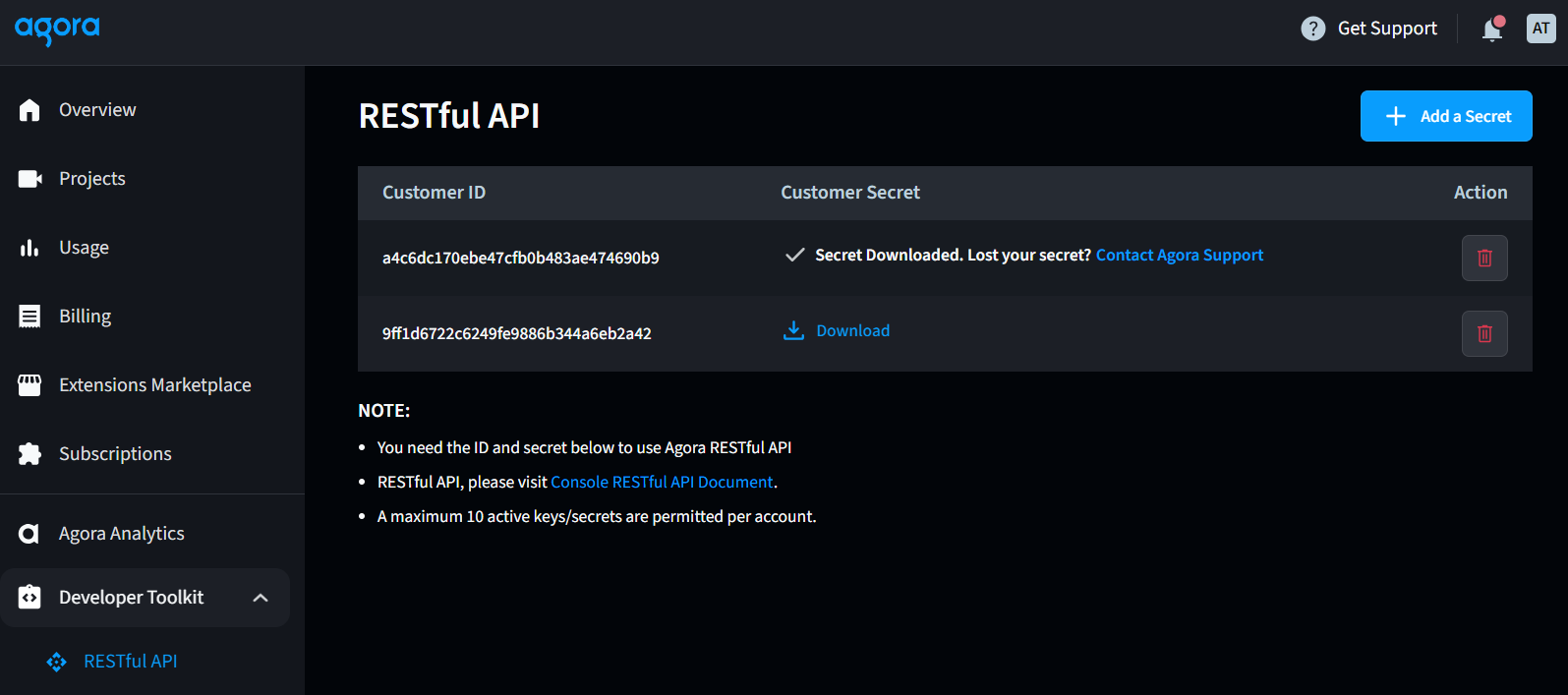RESTful authentication
Before using Media Gateway RESTful API, set up REST authentication. The following REST authentication methods are available:
-
Basic HTTP authentication
Generate a Base64-encoded credential with the customer ID and customer secret provided by Agora and pass the credential with the
Authorizationparameter in the request header.
-
HMAC HTTP authentication
You need to generate a signature through the HMAC-SHA256 algorithm and pass the signature and related information to the
Authorizationparameter in the request header. This option is recommended since it has a higher security level.
Implement authentication on the server to mitigate the risk of data leakage.
Implement basic HTTP authentication
Generate Customer ID and Customer Secret
To generate a set of customer ID and customer secret, do the following:
-
In Agora Console, click Developer Toolkit > RESTful API.

-
Click Add a secret, and click OK. A set of customer ID and customer secret is generated.
-
Click Download in the Customer Secret column. Read the pop-up window carefully, and save the downloaded
key_and_secret.txtfile in a secure location. -
Use the customer ID (key) and customer secret (secret) to generate a Base64-encoded credential, and pass the Base64-encoded credential to the
Authorizationparameter in the HTTP request header.
You can download the customer secret from Agora Console only once. Be sure to keep it secure.
Basic authentication sample code
The following sample code implements basic HTTP authentication and sends a request with the Server RESTful API to get the basic information of all current Agora projects.
- Java
- Golang
- PHP
- C#
- Node.js
- Python
import java.io.IOException;import java.net.URI;import java.net.http.HttpClient;import java.net.http.HttpRequest;import java.net.http.HttpResponse;import java.util.Base64;// HTTP basic authentication example in Java using the <Vg k="VSDK" /> Server RESTful APIpublic class Base64Encoding { public static void main(String[] args) throws IOException, InterruptedException { // Customer ID final String customerKey = "Your customer ID"; // Customer secret final String customerSecret = "Your customer secret"; // Concatenate customer key and customer secret and use base64 to encode the concatenated string String plainCredentials = customerKey + ":" + customerSecret; String base64Credentials = new String(Base64.getEncoder().encode(plainCredentials.getBytes())); // Create authorization header String authorizationHeader = "Basic " + base64Credentials; HttpClient client = HttpClient.newHttpClient(); // Create HTTP request object HttpRequest request = HttpRequest.newBuilder() .uri(URI.create("https://api.agora.io/dev/v1/projects")) .GET() .header("Authorization", authorizationHeader) .header("Content-Type", "application/json") .build(); // Send HTTP request HttpResponse<String> response = client.send(request, HttpResponse.BodyHandlers.ofString()); System.out.println(response.body()); }}package mainimport ( "fmt" "strings" "net/http" "io/ioutil" "encoding/base64")// HTTP basic authentication example in Golang using the <Vg k="VSDK" /> Server RESTful APIfunc main() { // Customer ID customerKey := "Your customer ID" // Customer secret customerSecret := "Your customer secret" // Concatenate customer key and customer secret and use base64 to encode the concatenated string plainCredentials := customerKey + ":" + customerSecret base64Credentials := base64.StdEncoding.EncodeToString([]byte(plainCredentials)) url := "https://api.agora.io/dev/v1/projects" method := "GET" payload := strings.NewReader(``) client := &http.Client { } req, err := http.NewRequest(method, url, payload) if err != nil { fmt.Println(err) return } // Add Authorization header req.Header.Add("Authorization", "Basic " + base64Credentials) req.Header.Add("Content-Type", "application/json") // Send HTTP request res, err := client.Do(req) if err != nil { fmt.Println(err) return } defer res.Body.Close() body, err := ioutil.ReadAll(res.Body) if err != nil { fmt.Println(err) return } fmt.Println(string(body))}<?php// HTTP basic authentication example in PHP using the <Vg k="VSDK" /> Server RESTful API// Customer ID$customerKey = "Your customer ID";// Customer secret$customerSecret = "Your customer secret";// Concatenate customer key and customer secret$credentials = $customerKey . ":" . $customerSecret;// Encode with base64$base64Credentials = base64_encode($credentials);// Create authorization header$arr_header = "Authorization: Basic " . $base64Credentials;$curl = curl_init();// Send HTTP requestcurl_setopt_array($curl, array( CURLOPT_URL => 'https://api.agora.io/dev/v1/projects', CURLOPT_RETURNTRANSFER => true, CURLOPT_ENCODING => '', CURLOPT_MAXREDIRS => 10, CURLOPT_TIMEOUT => 0, CURLOPT_FOLLOWLOCATION => true, CURLOPT_HTTP_VERSION => CURL_HTTP_VERSION_1_1, CURLOPT_CUSTOMREQUEST => 'GET', CURLOPT_HTTPHEADER => array( $arr_header, 'Content-Type: application/json' ),));$response = curl_exec($curl);if($response === false) { echo "Error in cURL : " . curl_error($curl);}curl_close($curl);echo $response;using System;using System.IO;using System.Net;using System.Text;// HTTP basic authentication example in C# using the <Vg k="VSDK" /> Server RESTful APInamespace Examples.System.Net{ public class WebRequestPostExample { public static void Main() { // Customer ID string customerKey = "Your customer ID"; // Customer secret string customerSecret = "Your customer secret"; // Concatenate customer key and customer secret and use base64 to encode the concatenated string string plainCredential = customerKey + ":" + customerSecret; // Encode with base64 var plainTextBytes = Encoding.UTF8.GetBytes(plainCredential); string encodedCredential = Convert.ToBase64String(plainTextBytes); // Create authorization header string authorizationHeader = "Authorization: Basic " + encodedCredential; // Create request object WebRequest request = WebRequest.Create("https://api.agora.io/dev/v1/projects"); request.Method = "GET"; // Add authorization header request.Headers.Add(authorizationHeader); request.ContentType = "application/json"; WebResponse response = request.GetResponse(); Console.WriteLine(((HttpWebResponse)response).StatusDescription); using (Stream dataStream = response.GetResponseStream()) { StreamReader reader = new StreamReader(dataStream); string responseFromServer = reader.ReadToEnd(); Console.WriteLine(responseFromServer); } response.Close(); } }}// HTTP basic authentication example in node.js using the <Vg k="VSDK" /> Server RESTful APIconst https = require('https')// Customer IDconst customerKey = "Your customer ID"// Customer secretconst customerSecret = "Your customer secret"// Concatenate customer key and customer secret and use base64 to encode the concatenated stringconst plainCredential = customerKey + ":" + customerSecret// Encode with base64encodedCredential = Buffer.from(plainCredential).toString('base64')authorizationField = "Basic " + encodedCredential// Set request parametersconst options = { hostname: 'api.agora.io', port: 443, path: '/dev/v1/projects', method: 'GET', headers: { 'Authorization':authorizationField, 'Content-Type': 'application/json' }}// Create request object and send requestconst req = https.request(options, res => { console.log(`Status code: ${res.statusCode}`) res.on('data', d => { process.stdout.write(d) })})req.on('error', error => { console.error(error)})req.end()# -- coding utf-8 --# Python 3# HTTP basic authentication example in python using the <Vg k="VSDK" /> Server RESTful APIimport base64import http.client# Customer IDcustomer_key = "Your customer ID"# Customer secretcustomer_secret = "Your customer secret"# Concatenate customer key and customer secret and use base64 to encode the concatenated stringcredentials = customer_key + ":" + customer_secret# Encode with base64base64_credentials = base64.b64encode(credentials.encode("utf8"))credential = base64_credentials.decode("utf8")# Create connection object with basic URLconn = http.client.HTTPSConnection("api.agora.io")payload = ""# Create Header objectheaders = {}# Add Authorization fieldheaders['Authorization'] = 'basic ' + credentialheaders['Content-Type'] = 'application/json'# Send requestconn.request("GET", "/dev/v1/projects", payload, headers)res = conn.getresponse()data = res.read()print(data.decode("utf-8"))Implement HMAC HTTP authentication
To implement HMAC HTTP authentication, you need the following information:
- App ID
- Customer ID and customer secret
HMAC authentication sample code
The following sample code demonstrates how to generate the value of the Authorization field: